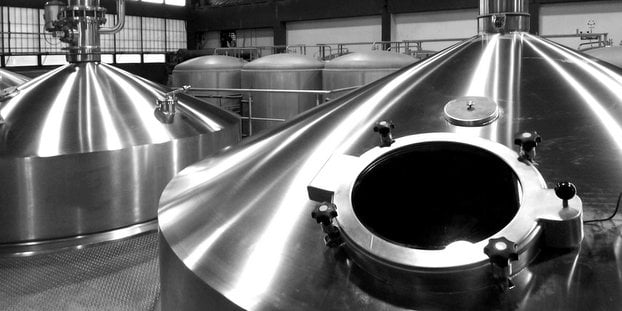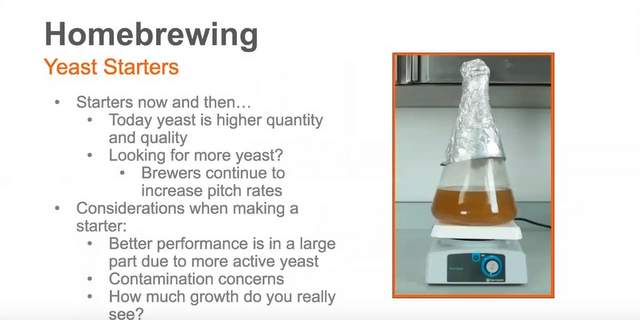Craft beer popularity is breeding excitement and complexity for craft brewers who are trying to keep up with the growth that comes from increased demand. The big focus at this year’s Craft Brewers Conference and Brew EXPO America was craft beer quality. While ‘brewing professional’ is the dream of many aspiring entrepreneurs, with that dream comes the responsibility of business ownership. As a craft brewer who lives and dies on the quality of your craft beer, the product is the one thing you can’t let drop. But where can you turn for brewing advice? Look no further than the relationships you are forging with your suppliers.
Suppliers of nearly all beer supplies – from brewhouses and fermentation tanks to hops and yeast – offer more than just ingredients and equipment. They offer a helping hand in the brewing process.
“Gusmer can help commercial craft brewers in almost all phases of brewing from grain handling to bright beer,” said Chris Atkinson, brewing division product manager and key accounts for Gusmer Enterprises Inc. “All technical issues that may arise within the brewing process, whether they are formulation [biochemical, microbiological, raw material based, stability], mechanical or operational can be addressed by myself or someone within the Gusmer team. We pride ourselves on the ability to give service with knowledge – and if we don’t have an answer, we lead our customers to those who do.”
It’s a sentiment that’s echoed by many companies with craft brewing clients, and that’s important because each segment of the brewing process, from the initial hop selection and contracting to the beer’s fermentation, has its own set of challenges. When selecting a supplier, you have to look beyond the products they are providing. Craft brewers have to probe the after-sale support offered by each company to ensure long-term brewery success.
One of the biggest questions to ask your current or prospective supplier, according to Melody Meyer, marketing manager for Hopunion LLC, is: How can I contact your staff?
“We feel that beer quality is going to be the driving force to keeping the momentum going in craft beer, so we focus on assisting with that by offering a number of laboratory services. These range from alcohol testing for export to bitterness analysis to nutritional analysis to gluten testing.” – Neva Parker, head of laboratory operations at White Labs“There are a lot of questions and obstacles that breweries face. If they are unable to have a direct relationship with their supplier, the odds of that relationship failing are much higher,” Meyer said. “At Hopunion, we offer each brewery a team of dedicated regional sales staff. Our Regional Sales Managers are in the field and equipped to offer any long-term planning questions while our Regional Sales Coordinators are located in Yakima, Wash., and offer direct sales support from contract fulfillment to spot purchases. Through this model, we are able to develop ongoing relationships with each of our customers that allow us to better understand their needs and in turn, communicate those needs with our growers. Through these relationships, we are able to answer any of the other questions that may arise.”
Neva Parker, head of laboratory operations at White Labs, added more questions to ask of your supplier: How much support will I receive from my supplier? How responsive will the supplier be when I have questions? Does my supplier have a library of materials that will help me learn more or answer questions? Will my supplier be understanding if I have a product issue?
“A recurring theme at this year’s CBC was, and I’m paraphrasing, ‘Don’t make bad beer,’” stressed Michael Dawson, brand manager for Wyeast Laboratories Inc. “I don’t necessarily see history repeating itself, but I’m sure everyone who was around for the end of the microbrew boom of the 1990s is remembering that time with trepidation as we look at all the brand new breweries in planning. I don’t think suppliers – established or new – should be exempt from that admonition, either. Craft beer lives and dies by its quality, and that starts with ingredients.”
Helping hops
Hops are hot. There are more varieties of hops-packed India Pale Ales on the shelves than ever before, and Craft Brewing Business does its fair share of reporting on hop trends and demand. With more brewers entering the market and increased demand, running low or out of hops is almost a rite of passage for today’s start-up brewer, it seems. We’ve written extensively about the importance of solidifying your hops contracts each year, but suppliers are also doing their part to keep you covered.
“For new breweries, there is typically a lot of concern that the hops they want are already sold out. When this occurs, our staff helps walk brewers through our entire portfolio of hops to better understand the brewing characteristics they are looking for and the many varieties that might fulfill their needs,” Meyer explained. “Many times, brewers discover a new variety they may have never even thought about.”
“As the craft industry continues to grow, both brewers and suppliers alike will need to be increasingly focused on making sure that quantity does not overshadow quality by maintaining a standard for their operations that exceeds the rest. This means knowing your products, where they come from, how they were produced and whether or not they were created with quality in mind.” – Melody Meyer, marketing manager for Hopunion LLCHop education is a big part of Hopunion LLC’s support plan. Each year, Hopunion LLC offers a two-day, hop intensive course, Hop & Brew School, where breweries can come to Yakima, Wash., to witness the harvest process and learn about the effort that growers put into developing premium quality hops for craft beer. Brewers are invited to visit the facilities, tour the farms, and build a personal connection with the growers. By witnessing the process of taking a hop from farm to kettle, brewers gain a greater sense of appreciation for their ingredients and the families that have dedicated their lives to the industry.
When brewers are back at the brewery, Hopunion LLC’s sister company, Alpha Analytics LLC, provides prompt and accurate hop and beer analysis to craft and homebrewers. Alpha Analytics runs all of its tests in accordance with ASBC methodology. The results from these services help hop growers plan for peak harvest windows and help brewers better understand the quality metrics affecting their hops and beer.
The sweetest science
As more craft brewers pour their heart and soul artistry into their beers, it still doesn’t mask the fact that brewing is a science – no amount of added exotic flavors is going to cover up a problem in your fermentation process, for example. One of the most common dilemmas of a new brewery is yeast management.
“We work with a lot of new brewers to help them develop their foundation in managing yeast pitching rates, fermentation monitoring and yeast handling,” said Parker from White Labs. “There are a wide range of services we offer to brewers, whether that means fielding technical brewing or fermentation questions or providing paid services that support beer quality. In general, we answer any and all fermentation-related questions and are happy to provide this as part of our mission to educate. We have put an emphasis on fermentation education, with both seminars at various conferences and workshops at our own teaching facility.”
“I don’t necessarily see history repeating itself, but I’m sure everyone who was around for the end of the microbrew boom of the 1990s is remembering that time with trepidation as we look at all the brand new breweries in planning. I don’t think suppliers – established or new – should be exempt from that admonition, either. Craft beer lives and dies by its quality, and that starts with ingredients.” – Michael Dawson, brand manager for Wyeast Laboratories Inc.The new wave of craft brewers has recruited heavily from homebrewers, so while they’re savvy beer folks, fermentation dynamics are a lot different when you scale up from 5 gallons, explained Wyeast Laboratories Inc.’s Dawson. “Wyeast has dedicated Tech Services and Lab staff to help with every phase of fermentation, from planning pitch rate to harvesting. We assist brewers with strain selection and order quantity based on parameters like brewery design, recipe, fermentation conditions, desired cell counts and budget – after the planning phase, we’re there to answer questions for everything that comes after pitching the yeast, flocculation, TG, things like that.”
Laboratory testing services are offered at all of the aforementioned companies – Gusmer Enterprises Inc., Hopunion LLC (via Alpha Analytics LLC), Wyeast Laboratories Inc. and White Labs. The focus is on process quality as much as it is beer quality. Without sound brewing production practices, you can’t brew delicious craft beer.
“We feel that beer quality is going to be the driving force in keeping the momentum going in craft beer, so we focus on assisting with that by offering a number of laboratory services,” Parker said. “These range from alcohol testing for export to bitterness analysis to nutritional analysis to gluten testing. We also launched Big QC Day in 2007, an industry-wide comprehensive beer analysis program at a cost-effective price that would promote quality control testing among craft breweries.”
Growing, growing, gone?
Brewery growth and expansion is exciting, but it’s also complicated. Even if your brewery was properly planned during launch, expansion creates a whole new set of challenges that you might not have anticipated. It’s important that you’ve built a network of supportive partners to help you weather the ebb and flow of expansion.
“Growth and expansion has been so drastic across all tiers of the craft brewing segment, we’ve seen a lot of clients who have only had their brewhouses open for a year or two bumping up against their capacity, to say nothing of the big regional and national brewers,” Dawson said. “So we have been successfully meeting the demand for larger custom pitches with our usual speedy turnaround, and making preparations to accommodate all the new breweries in planning as well.”
“With established brewers, we have helped them with process optimization, selection of the correct equipment for the next expansion, in-depth studies that improve filtration and product stability, improvement of in-line instrumentation and existing laboratory equipment,” Gusmer Enterprises’ Atkinson explained. “The list is too numerous to list due to our extensive product line – we have helped, assisted or been asked a question about every facet of craft brewing production.”
Increasing production yields is a hot topic fielded by Gusmer’s experts on a regular basis. The company does its part to educate brewers as to what processing aids will help them attain their goals and still allow them to stay true to “craft brewing.” “It always amazes me that so many new craft brewers do not understand what is available to them to help them along,” Atkinson said. “The largest issue for craft brewers building a new brewery is actually being able to measure what they are doing – we help them select process and laboratory instrumentation that gives them usable data.”
Asking too much?
You’re a craft brewer with a quality issue and you’re in over your head. It feels like you’re calling your suppliers for help day and night. Never fear – your suppliers are your partners in business. They are here to help you get the job done right.
“A trusted supplier should be able to answer all reasonable questions on the equipment they represent,” Atkinson said. “A brewer is asking too much of his supplier when they ask to review financial/business plans of the brewer. A brewer is also asking too much when they ask a supplier to divulge processing information of another brewer. Unless the question is ‘general knowledge’ a supplier treats each customer’s processing parameters as confidential information.”
“A trusted supplier should be able to answer all reasonable questions on the equipment they represent. A brewer is asking too much of his supplier when they ask to review financial/business plans of the brewer. A brewer is also asking too much when they ask a supplier to divulge processing information of another brewer.” – Chris Atkinson, brewing division product manager and key accounts for Gusmer Enterprises Inc. “Well, we won’t clean out your tanks for you,” Dawson joked when asked how much is too much. “Seriously though – yeast and fermentation is so involved and so high-stakes for any brewery, from one barrel to 100 barrel batches, and we’ve been propagating and supplying many dozens of strains for thousands of breweries for three decades, so we really encourage our clients to take advantage of that expertise and experience. Our team has many years of both practical brewing and laboratory/propagation experience, which is not something every supplier can say.”
“We believe the customer should expect a great level of support from any supplier,” echoed Parker. “These means being readily available to answer questions quickly and/or searching out the answer, if possible. The more support we can provide to our customers, the more we can keep this industry growing with great quality craft beer.”
Meyer summed it up nicely when she said: “Quality is in the details. As the craft industry continues to grow, both brewers and suppliers alike will need to be increasingly focused on making sure that quantity does not overshadow quality, by maintaining a standard for their operations that exceeds the rest. This means knowing your products, where they come from, how they were produced and whether or not they were created with quality in mind. Craft has always prided itself on being small, independent and traditional. With that in mind, it will be increasingly important for everyone in the industry to continue to uphold those values and not settle for anything less that the finest products possible.”






Building supplier relationships is key to brewery success http://t.co/9HhQlmqzxL
Building supplier relationships is key to brewery success http://t.co/dL8uuX0hI2
Building supplier relationships is key to craft brewery success http://t.co/FL2NKbKk8m
RT @CraftBrewingBiz: Strong relationships are key to #craftbrewing success: http://t.co/fJ6hkha0mS #CraftBeer #Quality
RT @Hopunion: Great piece on the importance of supplier support. @CraftBrewingBiz @whitelabs @Hopunion @Wyeastlab #Gusmer http://t.co/n8VPy…
Great piece on the importance of supplier support. @CraftBrewingBiz @whitelabs @Hopunion @Wyeastlab #Gusmer http://t.co/n8VPyH0gbZ
RT @HopSnobbery: Building supplier relationships is key to brewery success http://t.co/3sTgmCdzAH
Building supplier relationships is key to brewery success http://t.co/3sTgmCdzAH
“Supplier support: Building strong relationships is key to brewery success” http://t.co/bq3Bp40i6u
Building supplier relationships is key to brewery success http://t.co/gCm7X0eJLY via @craftbrewingbiz
Building supplier relationships is key to brewery success http://t.co/PzphCksud4 via @craftbrewingbiz